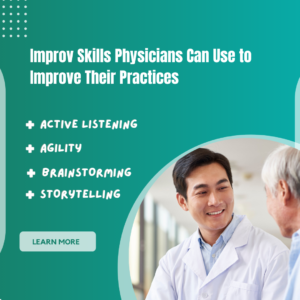Physicians are trained to find answers and draft a plan of action. We lead our patients and our teams in pursuit of the best care possible. on the fly when life, illness and injuries throw us a twist. How do we respond when things don’t go according to plan? When things go off script, how do we coordinate and communicate this change of plans? We often need to look beyond our traditional medical training to find skills that can benefit us professionally. Improv teaches many skills that can help us adapt and succeed when things don’t go as planned.

Four Improv Skills Physicians Can Benefit From
The world of improv has a lot to offer practicing physicians. Here are a few improv skills that can benefit physicians in a professional setting:
- Active Listening – Active listening is the art of being fully engaged with another person. When you are actively listening, you absorb what’s being said verbally and non-verbally and provide appropriate responses that continue a dialogue. Active listening is essential when communicating with patients, as well as colleagues and co-workers.
- Agility – Agility is when we stop planning how a conversation is going to go, and instead listen and respond. In medicine, we don’t seem to know which part of the system will fail. It’s important for physicians to be agile in their day-to-day practices, whether that’s during a surgical procedure or simply talking with a patient.
- Brainstorming – Free association, making connections, building on your team’s ideas, and eliminating mental blocks are all critical brainstorming skills from the world of improv that physicians can utilize to improve their teamwork and team building.
- Storytelling – Great storytelling requires focusing on the audience to craft a message for the listener, rather than for our own goals as the speaker. Being entertaining, memorable, and even informative doesn’t hurt either.
These are just a handful of the many skills taught by improv that physicians can use in their own practices. Practicing these skills and integrating them into our daily routines can help us on our journey to becoming more adaptive, agile physicians.
How can you incorporate these improv skills into your practice?
